
Anthony Bradbury writes:
"It is with sadness that I report that Lesley Leigh (née Stormont), former MYO player from 1957-61, and the orchestra's Hon Secretary from 1961-66, died peacefully on 15th March. Lesley remained an active supporter of the MYO throughout her life, helping to arrange the MYO Reunions of 2010 & 2013 and, along with former MYO Trustees Caroline Jephcott & Jeremy Patterson, helped to archive the MYO's records which are now stored in Birmingham Public Library."
In about 2007, Lesley wrote the following reflections on her years spent in the MYO:
"I joined the Midland Youth Orchestra in January 1957, the Saturday after the inaugural concert at the Town Hall in Birmingham. I was at that concert and knew straight away that I wanted to be in that amazing orchestra. They played Dvorak 4 which I thought was just divine, and I went straight out and bought the record, which I still have. I had never played a big symphony by a big composer before, and my first was to be Brahms 4 which was mind-blowing.
Sitting in the background at rehearsals was Blyth Major's wife, Myriam, who in the early days was music librarian and secretary and was always there with a smile and encouraging remarks if anyone was unhappy about something. She and Blyth certainly made a good team and were totally dedicated to the orchestra. Later they were joined by Jim Langley and Stephen Williams who were equally so. This was the only youth orchestra in the Midlands of its standard, and what an impact it has had on a lot of people's lives with many members going on to professional orchestras.
I spent 10 most enjoyable years in the orchestra and was Secretary for the last five. We had exchange trips with the Frankfurt Youth Orchestra starting with them coming to us in 1961 and us going over there in 1962 and 1965. I have kept in touch ever since with the person who stayed with me in 1961. We now go every year to stay with him and his wife. We spend a lot of time playing and six years ago met up with Peter Seifert, who used to be the secretary of the FYO, and we now play string quintets with him and his wife too. I have the MYO to thank for these lovely friendships. As far as we are aware, we think we are the only people who have stayed in contact from that first trip.
It is thanks to the MYO that I have many other lovely friends and have gone on to play so much music in the past 50 years. For this I shall be eternally grateful."
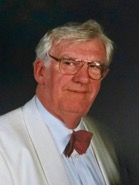
In recognition of Stephen's significant contribution to the MYO and to music education in the Midlands, a Commemoration Concert in aid of the James Langley Memorial Trust (JLMT) took place on Saturday 26th January 2019 at The Bradshaw Hall, Royal Birmingham Conservatoire, featuring an orchestra of over 60 MYO Alumni.
The soloist was former CBSO Youth Orchestra leader Charlotte Moseley (Violin), and the orchestra of MYO Alumni was lead by MYO Alumnus (and former Leader) David Gregory and conducted by former MYO Music Director Anthony Bradbury. The programme consisted of Stephen's own composition ‘In Search of Altruism’, along with Bruch's Violin Concerto No.1 in G minor and Tchaikovsky's Symphony No.5 in E minor. Further details, along with some photos, can be found on the Reunions page.
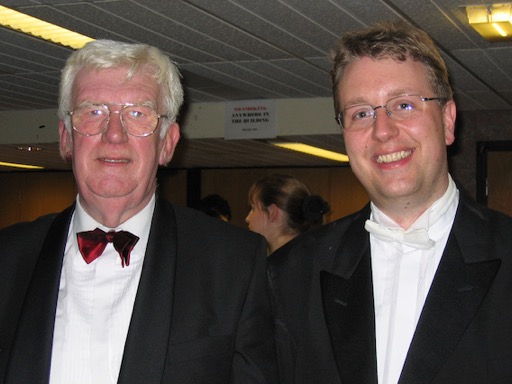
Anthony Bradbury writes:
"It is with much sadness that I report that Stephen Williams, a founder MYO player and then variously the MYO's Associate Conductor, Conductor, Music Director and Chairman, died peacefully on 7th March at The George Eliot Hospital, Warwickshire.
I clearly remember the first day that I arrived at Aston University to audition for the Midland Youth Orchestra as a fresh-faced, 16-year-old clarinettist. I had just started my A-Levels at King Edward VI College, Stourbridge, which had a vibrant music department at the time. A couple of my fellow students were MYO members and suggested that I auditioned. It was actually Stephen’s colleague, Jim Langley, who auditioned me, and I was very nervous. Jim must have seen some potential in this decidedly average player as he allowed me to stay for the rehearsal to see how I fared.
That first rehearsal left an indelible impression on me. The standard of playing was in a different league to that which I’d experienced at school. I felt that I had joined a “proper” orchestra – professionally run, but in a friendly manner. All of the hallmarks of Stephen were evident in that first encounter, especially his musical expertise, and his humour. I thought to myself: here’s a conductor who really knows his stuff. And so started my 20-year association with the MYO.
As many past MYO players will no doubt testify, the MYO “family” – since that’s what it was – was a very special institution. It was a pioneer in the early days of the youth orchestra movement, established by the visionary Blyth Major, tackling repertoire beyond the reach of most other youth orchestras, playing in world class venues, and run and tutored by professional musicians.
But, just as importantly, it was a wonderfully friendly and nurturing organisation where everyone was made to feel welcome, and where all were encouraged to give their best. It was also a true team effort – the support from the parents in particular was terrific, with many continuing to help the orchestra long after their children had left, and I am eternally grateful for the expertise of our sectional tutors such as David Gregory and Ian Ludford (to name but two) who gave up their precious free time to assist us over so many years. The MYO also benefitted from the loyalty and commitment of its conducting staff which, for nearly 50 years, was principally just four people: Blyth Major, Jim Langley, Stephen and me.
Stephen used to describe the MYO as an “upturned pyramid” – with the conductors at the bottom, and the players above; in other words, Stephen believed that the MYO’s fundamental role was to realise the potential of its members, with the music staff simply facilitating this objective. This philosophy was typical of Stephen and the selfless way he viewed his service to the young players. And this sense of family was deeply felt. Nothing would please Stephen more than hearing about what past players were up to – whether that be working in the music profession (as many did), or in other walks of life. The MYO had long tentacles, and there are multiple generations of musicians who owe their start in life, in some shape or form, to the MYO.
Stephen was a very rounded musician. His knowledge of the repertoire – especially the orchestral repertoire – was outstanding. This was clearly driven by his education, but moreover his natural inquisitive nature that stayed with him throughout his life, plus his love of sharing this knowledge which manifested itself in MYO rehearsals.
As a conductor, Stephen was highly skilled, and his abilities had a huge influence on my own musical development. As a pupil of Sir Adrian Boult, Stephen had an excellent “stick technique,” with a real clarity of direction that is a rarity – and this clarity is an absolute boon for young players. In the nicest possible way, but in a direct manner nonetheless, Stephen would pick me up privately on instances where I had not been clear to the orchestra, or where I’d given misleading direction – I’m so grateful for this advice since this is how I learnt and, over time, improved.
Stephen was also a master at rehearsing young players, which is the key to securing a successful performance, as it’s during rehearsals that the hard work takes place. Like an expert doctor, Stephen would make an insightful diagnosis that would get straight to the heart of the matter that needed to be sorted – so often what he called the “undercarriage” of the music rather than what would more obviously catch the listener’s ear. His hypothesis was that, if the foundation was secure, then so many other elements simply fell into place. I can’t tell you how true that is.
But it’s also Stephen’s humour in rehearsals that many of us will remember – he always struck just the right balance between light-heartedness, seriousness and hard work that engaged and inspired his young players to give their best, and for the musical whole to exceed the sum of its parts. There’s a generation of musicians who now refer to music rehearsal letters not simply as “letter A, “letter B” etc. but by a wholly, Stephen-invented lexicon such as “H for Rugger Posts”, “G for String”, “L for Leather” and, my personal favourite, “K for Special”. Orchestral passages that were in need of ‘major surgery’ were described as molto dodgioso, and he had nicknames for many of the instruments, my favourite being the violas whom he called “Bratsche Scratchers”, a clever play on words from the German for viola which is Bratsche.
I am hugely grateful to have known Stephen – first as pupil, then apprentice, then colleague, and finally adopted family. He was a dear friend to me, and my wife Jenni, and a loving husband, father and grandfather to his family. There are very few people I have met who instil an instantly warm and smiling reaction in everyone, the moment their name is mentioned – my grandfather was one, and Stephen is another. My life, and those of many others, has been enriched from having known him, and I am sure I speak for the whole “MYO family” when I say that the memory of Stephen will live long in our hearts."

After the tremendous efforts of Jeremy Patterson, Caroline Jephcott and Lesley Leigh in sorting and cataloguing nearly 50 years of MYO history, the MYO's archives were handed over to the Archives & Collections department, Library of Birmingham, on 5th May 2017 (Accession No. 2017/020, Collection Reference MS 4880). On behalf of the MYO, Jeremy signed a formal Agreement for the deposit of records (i.e. archives) between Birmingham Archives, Heritage & Photography (BAH&P) and the MYO on an indefinite loan basis. BAH&P is the professional archives service for Birmingham City Council and the Agreement states that "all records received will be held for the benefit of the public."
Records are made available to the public in the Library of Birmingham's research room free of charge, under supervision (music equipment available). Subject to copyright, a copy of an item from the records may be provided on request from the public for the purposes of private study only, at the discretion of the Head of Service.
You can also search the Library of Birmingham's online catalogue here or, should you wish to arrange to inspect the archives in person, you can email the Library of Birmingham's archivist or telephone 0121 242 4242. A brief introduction to the MYO's archives, written by the group who catalogued it, can be viewed here.
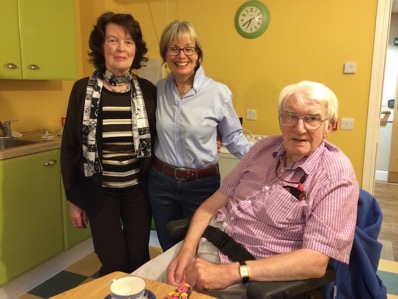
Anthony Bradbury writes:
“My wife Jenni and I visited Stephen just before Christmas and spent an enjoyable afternoon with him and his wife Eileen in the ‘1960s Kitchen’ of his retirement home. He was in good spirits and sends his best wishes to everyone.”
Stephen Williams - an update (April 2014)
After suffering a stroke about a year ago, Stephen continues to make a steady recovery. He is now resident in a retirement home near to his home in Burbage, Leicestershire, and receiving excellent care from the staff there. Everyone involved with the MYO wishes Stephen all the very best for his continued recovery.
MYO makes donation to the JLMT (March 2014)
Following two successful MYO Reunions, the balance of the MYO Reunions account was donated to the James Langley Memorial Trust.
Julian Marx (October 2012)
Stephen Williams and Lesley Leigh (née Stormont) write:
“It is with great sadness to inform you that Julian Marx passed away on 4th October, aged just 59, from a heart attack following a bout of pneumonia. Julian played viola in the MYO from 1968-1973 and went on to play with Orchestra de Camera, Dee String Quartet (which he founded), the Delos Quartet, the Aberdeen and City of Birmingham Symphony Orchestras, to name but a few.
We shall be sending a card of sympathy on behalf of past members of the MYO who knew Julian giving our condolences to the whole family, including his sister, Stella, who also played in the MYO (1968-1971).”
![[MYO Hon Secs]](files/honsecs.jpg)
Four former Honorary Secretaries of the Midland Youth Orchestra met in Banbury to commence planning of the next MYO Reunion. Pictured, from left to right, are Stephen Williams (Hon Sec, 1959-61), Caroline Jephcott (Hon Sec, 1997-2001), Lesley Leigh [née Stormont] (1961-66), and Angela Orgill [née Smith] (1966-67 and 1971-72).
Blyth Major commemorated in Musicians’ Book of Remembrance (April 2010)
Upwards of 250 people gathered at St. Sepulchre’s Church (the National Musicians’ Church), London, for a Service of Thanksgiving for the nearly 40 musicians whose names were entered into the Musicians’ Book of Remembrance this year, including Blyth Major (the MYO’s founder), Lena Wood and, coincidentally, Blyth’s daughter Margaret who was the violist of the world-famous Aeolian String Quartet. The service was enriched by the superb singing of the Birmingham Conservatoire Chamber Choir performing music by, among others, Herbert Howells and James MacMillan.
The ‘knock-on’ effect of the Icelandic volcano was even felt at this ceremonial occasion because one of the Lessons was due to be read by Professor George Caird, Principal of the Conservatoire, but he was unfortunately stranded abroad. Jeremy Patterson (a former MYO leader) was a most admirable substitute reader.
After the service there was an opportunity to meet old friends over a drink of wine. Among past MYO members present were Beryl Langley (bassoon), Jim and Margaret Lowe (horn and flute respectively), Angela Orgill (violin, and past Hon. Sec.), Howard Breakspear (viola), Gill Harris and Frances Colclough (violins), many of whom will be participating in the MYO Reunion on 12th June. Another welcome face was that of Nicola Wallis who worked closely with Blyth and was a most able administrator in the former International Festival of Youth Orchestras.
The whole occasion was a fitting one at which to recognise the huge contribution made by Blyth to the orchestral/educational world. Though more hidden, the contribution made by Lena Wood was of enormous importance too, for there are countless numbers of professional violinists/violists who owe their careers to her, quite apart from the benefits that she brought to other instrumentalists through her chamber music coaching.
![[Myriam Major]](files/myriam.jpg)
Stephen Williams writes:
“It is with much regret and sadness that I have to announce that Myriam Major, widow of the MYO’s founder Blyth Major, passed away in hospital in Chichester on Tuesday 5th January 2010.
“Writing as one who, together with Beryl Langley and Lesley Leigh, was in regular contact with Myriam from 1956 right through to the present day, I can attest to the enormous and valued contribution that she made to the Midland Youth Orchestra. From her time as Blyth's immediate associate when the MYO was first created, then throughout the full life and history of the International Festival of Youth Orchestras, and right up to the moment of the MYO's transition into the CBSO Youth Orchestra and beyond, she was always on hand (if behind the scenes) to offer advice and encouragement. She and Blyth ran the orchestra as a highly successful double act in those early years - until I became its first official Hon. Sec. around 1960 - and, although she never again held a formal post within the orchestra, she was in effect a much-valued Hon. Director and her support for Blyth, then James Langley, myself and Anthony Bradbury, and the orchestra was unwavering. I personally had very good reason to be deeply appreciative of this as I received from her so much encouragement as I discussed with her every strand of the MYO's metamorphosis leading up to 2004.
“My wife Eileen and I last saw Myriam in the late summer of 2009 when we visited her in Chichester in order to plan the application for Blyth Major's name to be recorded in the Musicians' Book of Remembrance at a ceremony/service which will take place at St. Sepulchre's, the Musicians' Church, City of London in April 2010. She was absolutely delighted that the application had been successful and it is all the more poignant that she did not live to see the project through to its conclusion. When we were with Myriam in the summer we found her to be physically somewhat frail, but her spirit was totally undimmed and Eileen and I entertained her to what proved to be an hilarious dinner as we reminisced over so many MYO/IFYO matters and personalities from the past. Her death does indeed mark the passing of an era.”
![[Alison Bach]](files/alisonb.jpg)
Alison Bach, the MYO’s last Principal Horn, performed Oliver Knussen’s demanding Horn Concerto with the Birmingham Philharmonic Orchestra at the Artrix Centre, Bromsgrove, on Sunday 9th December 2007, with the MYO’s last Music Director Anthony Bradbury conducting.
MYO Reunion Lunch (September 2007)
Caroline and Richard Jephcott, a past Secretary and Trustee of the MYO respectively, kindly hosted a lunch for some past players/staff and friends at their home in Bromsgrove. It was wonderful to meet baby Sam Elliot, first son of Claire & Phil Dawes (see marriage announcement below – November 2003!), who was just 8 weeks old. The lunch was attended by no less that five past Secretaries!
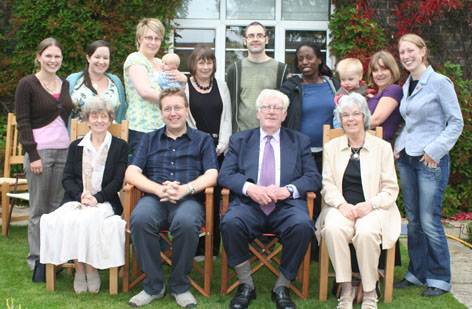
Past Players of the MYO
Pictured from left to right are [back row] Michelle Garner (violin), Anna Jephcott (violin), Claire Dawes [nee Beckett] (horn) with son Sam, Olivia Goodborn (cello), Phil Dawes (horn), Janet Mountford [nee Lindsay] (cello), Anna Price [nee Downes] (violin/leader) with son Oscar, Claire Stevenson (cello), [front row] Lesley Leigh [nee Stormont] (violin), Anthony Bradbury (clarinet), Stephen Williams (viola), Beryl Langley (bassoon)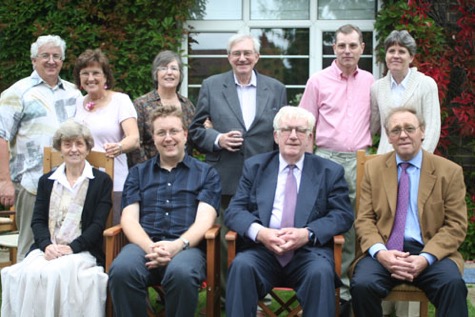
Past Staff of the MYO
Pictured from left to right are [back row] Richard Jephcott (Trustee), Caroline Jephcott (Secretary), Val Templeton (Secretary) with husband Don, Phil Garner (Secretary) with wife Marie, [front row] Lesley Leigh [nee Stormont] (Secretary), Anthony Bradbury (Conductor), Stephen Williams (Conductor/Chairman), Roy Stevenson (Secretary)
![[MYO 50th]](files/myo4052b.jpg)
MYO’s 50th Anniversary
(October 2006)
At their concert in the Warwick Arts Centre on Sunday 29th October 2006, the occasion of what would have been the 50th Anniversary of the MYO was marked by the CBSO Youth Orchestra. Six members of the final MYO were playing in the concert (as members of the CBSO YO), and over 60 past players returned for the celebrations. For full details, click here.
The CBSO Youth Orchestra is born
(March 2004)
From the autumn of 2004, the MYO will form the nucleus of the exciting new CBSO Youth Orchestra. “The MYO can look back on 48 years of exciting music-making with great pride,” explains Stephen Williams, Chairman and former Music Director of the Midland Youth Orchestra. “These years have included memorable visits to many international festivals in Europe and across the Atlantic, personal contacts with major international figures in music, world premieres and, of course, that regular pursuit of seeking to perform the finest music as best we can. Blyth Major initially set up the MYO as a ‘nursery’ for the CBSO. Now, nearly half a century later, the creation of the CBSO Youth Orchestra will be a home-coming and yet another great step forward which Anthony and I welcome with relish.”
![[Phil & Claire]](files/hornmar.jpg)
Last year’s Principal Horn, Phil Dawes, has announced his engagement to Claire Beckett, another past Principal Horn who was a member of the MYO from 1991–6. Both players gave 5 years of loyal service to the MYO and continue to support the orchestra to this day. Everyone connected with the MYO wishes them well for their wedding next summer and every happiness for their future life together.
Pictured here are Phil (left), Claire (right), and the MYO’s Music Director Anthony Bradbury (centre).
![[Wind Quintet]](files/quintet.jpg)
A Wind Quintet made up of members from the woodwind and brass sections performed at the UK’s largest free arts festival, ArtsFest, in the Waterhall, Museum & Art Gallery, Birmingham, on Saturday 13th September, to promote the work of the MYO. A considerably sized audience turned up to hear them, thanks to the festival’s publicity. The group performed a nicely balanced programme, including works by Franz Danzi and Sir Malcolm Arnold, along with a marvellous, ‘foot-tapping’ medley of MGM film tunes.
The MYO also ran an ‘Ask it!’ stall in Centenary Square where other members of the orchestra handed out leaflets and answered questions on the orchestra and its activities. The excellent weather made the weekend all the more enjoyable!
![[Patrick Strub]](files/strub1.jpg)
(July 2003)
Following a very successful collaboration at the Banff International Festival of Youth Orchestras in 2000, the MYO invited the renowned German conductor Patrick Strub to direct a concert in Birmingham. A weekend of rehearsals led to an extremely successful concert in the Adrian Boult Hall on 13th July featuring composers from four European countries. As well as works by Wagner, Butterworth and Borodin, the orchestra performed Franck’s mighty Symphony in D minor.
![[Paul Daniel]](files/daniel2.jpg)
(June 2003)
Paul Daniel, Music Director of English National Opera and Patron of the MYO, took his third orchestral masterclass on 28th June 2003 at Aston University. He worked on Wagner’s Meistersinger Prelude, Butterworth’s A Shropshire Lad and Borodin’s Polovstian Dances from Prince Igor. Once again his skill, enthusiasm and energy were inspirational to the MYO’s young players.
Premiere of new work by Andrew Downes is a family affair!
(March 2003)
At its concert on 8th March, the MYO was delighted to premiere a new work for soprano and orchestra entitled A Celtic Rhapsody by local composer Andrew Downes, Head of Creative Studies at Birmingham Conservatoire.
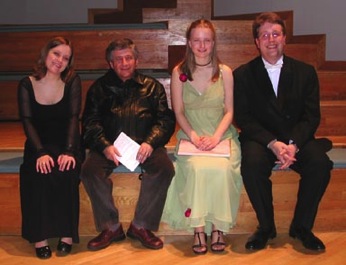
MYO String Octet performs at Three Choirs Festival, Worcester (August 2002)
The MYO String Octet took part in the world-famous Three Choirs Festival by playing in a concert organised as part of the festival’s fringe programme of events in Huntingdon Hall, Worcester. They shared the concert platform with the Toronto Children’s Chorus, hailed by Sir David Willcocks as “one of the finest children’s choirs in the world”. The Octet prepared a programme of music specially for the occasion, including Mozart’s Divertimento No. 1 and works by Bach, Joplin and Rodgers. Paul Vaughan, the Festival’s Vice Chairman, is hoping to involve the full orchestra in the 2005 Three Choirs Festival.
The Orchestra’s First Patron - PAUL DANIEL, Music Director, ENO (October 2001)
The MYO is delighted to be able to announce that PAUL DANIEL, Music Director of English National Opera, London, has accepted the orchestra’s invitation to become the very first Patron of the MYO.
Though the orchestra has had the honour of being directed by distinguished guest conductors (including Sir Simon Rattle) throughout its 45-year history, this is the first occasion that such a relationship has been formalised. Paul Daniel first gave a memorable Masterclass with the MYO in January 2000 when he directed the orchestra in Verdi’s Force of Destiny Overture and Walton’s suite to Henry V. Of his new role as Patron, Paul Daniel has insisted that it shall be a ‘hands-on’ appointment.
![[The Cole Family]](files/coles.jpg)
and all are violinists! (March 2001)
In what could perhaps be a first for a UK youth orchestra, four sisters played in the two most recent MYO concerts in March... and all as violinists. The oldest, Heather Cole, recently left the orchestra to go to university, but returned as a guest player. The three younger sisters – Alison, Stephanie and Vanessa – are all current members of the MYO. Pictured here with Music Director Anthony Bradbury are (from left to right): Stephanie (Principal Second Violin), Alison (First Violin), Heather (Guest First Violin) and Vanessa Cole (Second Violin).
![[Sir Malcolm Arnold]](files/arnold.jpg)
The MYO was delighted to welcome the world-renowned British composer, Sir Malcolm Arnold, to its concert on 24th March in Bromsgrove, Worcestershire, to hear a performance of the composer’s Second Symphony. Pictured opposite are (from left to right): Stephen Williams (Chairman, MYO), Anthony Day (Sir Malcolm’s minder) and the composer.
MYO Chamber Groups in action (March 2001)
Two MYO chamber groups, a string octet and a horn quartet, played at Webbs Garden Centre, Bromsgrove, on 4th March to promote the MYO’s charity concert in aid of the NSPCC.
BBC Music Live (May 2000)
During May Bank Holiday, the MYO’s string octet and brass quintet played in Cannon Hill Park, Birmingham, taking part in BBC Music Live, a weekend of music events held throughout the UK supported by BBC radio and television. The weekend’s activites in Birmingham were broadcast on Radio WM and attended by many thousands of people from the Midlands.
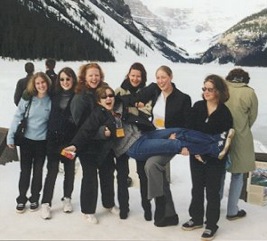
In April 2000, the Midland Youth Orchestra attended the Banff International Festival of Youth Orchestras in Alberta, Canada, at the heart of the Canadian Rocky Mountains. For a full report on the orchestra’s visit to Canada, please click here.
Paul Daniel takes orchestral masterclass
(January 2000)
The MYO was delighted to work with the world-renowned Music Director of English National Opera, Paul Daniel, at a masterclass in January. Paul Daniel rehearsed Verdi’s Force of Destiny Overture and selected movements from Walton’s Henry V Suite. Paul Daniel’s insight into both works was most revealing, and his musicianship and skill was inspirational to the orchestra's young players.
![[Guinness]](files/guinness.jpg)
(January 2000)
After a marathon 12 hours of continuous playing, the Midland Youth Orchestra established a new record for the world’s longest concert, a record which has since been ratified by Guinness World Records. The record attempt, which involved the performance of over 75 pieces of music with breaks of not more than 30 seconds in between each one, was an exhausting experience. In addition to over 65 musicians who took part, the event required a huge support team of parents, qualified medial staff and independent witnesses. The report here, which appeared in the Stratford-upon-Avon Herald on 3rd February 2000, sums up the atmosphere of the day:
Record Breakers...
You've seen it on TV, or bought the book at Christmas, and perhaps been amused by the daft things people do to get themselves into the Guinness Book of Records. But for those making the record breaking attempts it is not always a laughing matter! On Saturday I joined the members of the Midland Youth Orchestra, their two conductors and a huge support system as they prepared to attempt a world playing record in room 708, Aston University, Birmingham.
Their aim was to play 12 hours of continuous music beginning and ending with full orchestral works, with the odd symphony, concerto, quartet and quintet in between. It was to be sight-reading throughout, no chance of rehearsal and no time to warm up. And as GBR rules state that there must he no more than 30 seconds between each piece the changeovers were sometimes hair-raising!
The whole performance had to be videoed, independent witnesses have to submit reports along with stewards’ records showing that no-one was out of the room for more than five minutes at a time - queues in the ladies’ loo was the biggest problem here! - to prove to the powers that be at GBR that the musicians did what they said they did. Medical staff had to be on hand, working no more than four-hour shifts, and two physiotherapists set up their couch amongst the instrument cases offering muscle relief for those in need.
By the time musical director Stephen Williams had given out all the notices the record-breaking attempt was running late, but at 11 minutes past 10am Anthony Bradbury raised his baton and Dvorak’s Symphony No. 8 filled the air - and indeed the whole building. For at this point examinees in the room below had a shock, and frantic staff at the university scurried up the stairs to ask the orchestra to keep the noise down! There really was no answer to that, other than to close the windows and hope for the best!
The programme was stunning, with Haydn’s Trumpet Concerto (soloist Richard Moore), Tchaikovsky’s Symphony No. 5, and Weber's Clarinet Concerto No. 1 (soloist Lucy Tugwell) all within the first 20 pieces. There was also Pachelbel’s Canon, Mussorgsky’s Pictures at an Exhibition, Sibelius’ Symphony No. 2 and a good mix of minor pieces to feast upon with Mr Bradbury sharing the conducting with his assistant James Ross.
Spirits, and standards, remained reasonably high all day - wonderful stuff adrenaline! - though it has to be said that the opening of the Blue Danube Waltz (item 73 on the original running list) was poco dogioso to say the least. Never mind, the rules say the music has to be recognisable, not necessarily perfect.
The programme should have ended with the Thunder and Lightening Polka by Strauss, but enthusiasm had got the better of the orchestra and by 9.30pm they were well ahead of schedule - so as they started they finished, with Dvorak.
A masterly piece of tension building by Anthony Bradbury here, as at the end of the second movement he cancelled the third - leaving the supporting crew of parents believing that he did not know how far away from time he really was and they would lose the record by little more than a minute.
But, no, he teased the players through the slower part of the fourth movement, holding back as they longed to burst forward into the finale. Sighs of relief were audible as the clock showed 11 minutes past 10pm and the players were let loose into a finale which would have done Symphony Hall proud!
Report by Anne Tugwell
Stratford-upon-Avon Herald
3rd February 2000
At the beginning of November 2000, the MYO held a reception for its President, the Lord Mayor of Birmingham, in celebration of its world record achievement.
The orchestra’s official Guinness World Record certificate was also on display.
